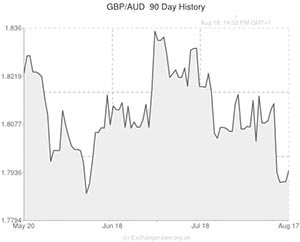
The Pound Sterling to Australian Dollar exchange rate is trending around 1.7944, moving between a low of 1.7926 and a high of 1.7969. Movement is currently around 0.22% which is likely due to second quarter UK Gross Domestic Product (GDP) revisions and Bank of England Governor Mark Carney’s comments.
The past week was particularly painful from a UK economic perspective. A falling unemployment level would have ordinarily been a cause for celebration; but unfortunately it was coupled with diminishing wage growth. The miscorrelation between wage growth and unemployment had an instant detrimental effect on the strength of the Sterling.
Sterling issues were increased after the Bank of England (BoE) released an inflation report which saw a continuation of current monetary policy and an unchanged interest rate. The dovish report was fundamental to Sterling’s continued losses for the remainder of the week, and Governor Carney’s intimations that a shift of focus to wages rather than unemployment stubbed out speculation for a near-future interest rate hike.
Last week started pretty badly for the Australian Dollar as geopolitical tensions drove traders towards safe-haven currencies. As the geopolitical issues became a less prominent a focus for traders however, the ‘Aussie’ firmed up.
With a lack of domestic data pertaining to either the Pound or the ‘Aussie’ (AUD) the exchange rate has remained similar to Friday.
A slight strengthening can be attributed to the recent Office for National Statistics (ONS) revisions to second quarter UK GDP growth. The revisions saw a 0.1% annual increase to the British economy which has bolstered the Pound against many of the majors.
Given that China is Australia’s biggest trade partner, perhaps another reason for the fractional increase to the Pound to Australian Dollar exchange rate is today’s Chinese year-on-year Foreign Direct Investment Report. The report showed a dramatic decrease from 0.2% to -17.0% despite having been forecast to rise to 0.8%.
The Pound to Australian Dollar exchange rate has hit a low today of 1.7926.
Forecast for the GBP to AUD Exchange Rate
Tomorrow sees the release of the UK year-on-year Consumer Price Index (CPI). The report will be of significant importance as the CPI is the key measure of inflation for the UK and is used by the Bank of England in making interest rate decisions. It is forecast to drop from 1.9% to 1.8%. Similarly the UK Retail Price Index (RPI) will have an influence on future interest rate decisions. RPI is forecast to fall fractionally from 256.3 to 256.2.
Wednesday’s Bank of England policy meeting minutes will be less significant than usual due to the expectation that the data will offer no fresh news.
Thursday’s Retail Sales data will be of interest. The annual pace of retail sales gains is forecast to drop from 4.0% to 3.5%.
This week will see very little by way of Australian domestic data. Wednesday’s RBA Governor Stevens Semi-Annual Testimony may influence movement for the ‘Aussie’.
Thursday’s China Manufacturing PMI will also be significant for those invested in the Australian Dollar.
The Pound Sterling to Australian Dollar exchange rate is currently trading in the region of 1.7952.
GBP to AUD Exchange Rate Weakens Slightly Following RBA Minutes
The Pound Sterling to Australian Dollar exchange rate is currently trending in the region of 1.7841. The weakening of the exchange rate is related to the Reserve Bank of Australia (RBA) minutes that were released in the early hours this morning as well as the UK’s disappointing CPI data.
The RBA minutes outlined that the nation’s economic outlook remains uncertain, and interest rates are to remain low as a result. Despite the pessimistic tone of the comments, however, the ‘Aussie’ has gained against many of its peers. This is likely due to the fact that the minutes held true to the statement from the meeting itself, where it was indicated that interest rates are likely to remain on hold for the foreseeable future. Meanwhile, the UK’s CPI showed a steeper-than-forecast slowing in the pace of inflation, triggering widespread Pound losses.

Comments are closed.